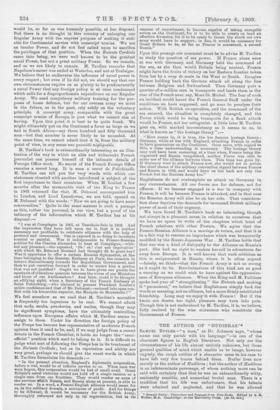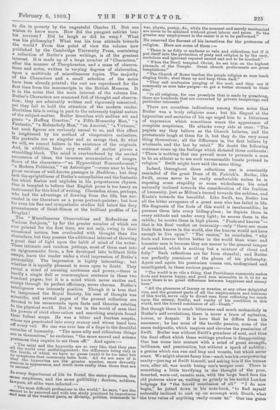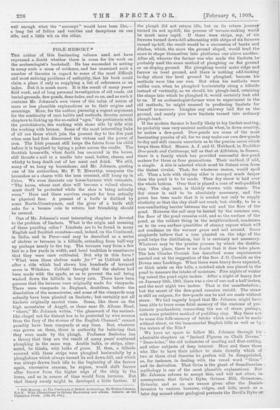THE AUTHOR OF " HUDIBRA.S."
SAMUEL BUTLER—" a man," as Dr. Johnson says, "whose name can only perish with his language "—is one of the obscurest figures in English literature. Not only are the circumstances of his life almost entirely unknown, but those general qualities of mind which enable us to image, however vaguely, the rough outline of a character seem in his case to have left very few traces behind them. Butler lives now merely as the author of Hudibras ; but the author of Hudibrai is an indeterminate personage, of whom nothing more can be said with certainty than that he was an extraordinarily witty, eminently sensible, and somewhat brutal man. There is a tradition that his life was unfortunate, that his talents were admired and neglected, and that he was allowed • Samuel Butler: Characters and Passages from Rot,-Books. Edited by A. U. Wailer, M.A. Cambridge: at the University Proke. L4.. Sd. stet.] ' to die in poverty by the ungrateful Charles II. But one wishes to know more. How did the pungent satirist bear his sori:ows ? Did he laugh or did be weep ? What was his philosophy ? What was his true attitude towards the world P From this point of view the volume now Published by the Cambridge University Press, containing a collection of Butler's prose writings, is of the greatest interest. It is made up of a large number of "Characters," after the manner of Theophrastus, and a mass of observa- tions and notes, written in varying degrees of elaboration, Upon a multitude of miscellaneous topics. The majority of the Characters and a small selection of the notes have been already printed; the rest are reproduced for the first time from the manuscripts in the British Museum. It is in the notes that the main interest of the volume lies. Butler's Characters are crammed full of thought and observa- tion; they are admirably written and vigorously conceived; yet they fail to hold the attention of the modern reader. Doubtless this is owing in part to the extremely topical nature of the subject-matter. Butler describes with endless wit and gusto "a Huffing Courtier," "a Fifth-Monarchy Man," "a Fantastic," "a Melancholy Man," "an Amorist," "a Virtuoso," but such figures are curiously unreal to us, and this effect is heightened by his method of vituperative caricature. lie portraits are so singular and so savage that, do what We will, we cannot believe in the existence of the originals. And, in addition, their very wealth of matter proves a
stumbling-blocic. The mind is overburdened by the serried succession of ideas, the immense accumulation of images. Some of the characters—" an Hypocritical Nonconformist," "a Modern Politician," "an Astrologer "—come near to being
prose versions of well-known passages in Hudibras ; but they lack the sprightliness of Butler's octosyllabics and the fantastic
fun which flashes and explodes in his preposterous rhymes.
One is tempted to believe that English prose is too heavy an instrument for this kind of writing. Clarendon alone, perhaps, who had the advantage of drawing from the life, has suc- ceeded in our literature as a prose portrait-painter ; but how fur even his fine and sympathetic studies fall below the fiery
Presentments of Saint-Simon or the brilliant profiles of La 13ruyere !
The " Miscellaneous Observations and Reflections on Various Subjects," by far the greater number of which are row printed for the first time, are not only, owing to their
occasional nature, lees overloaded with thought than the Characters, but they possess the additional interest of throwing a great deal of light upon the habit of mind of the writer, These intimate and random jottings, most of them cast into an epigrammatic form, a few developed into brilliant little ossays, leave the reader under a vivid impression of Butler's Personality. The impression is highly interesting ; but Whether it is equally pleasant is more open to doubt. They reveal a mind of amazing acuteness and power,—there is hardly a single dull or commonplace sentence in these two hundred pages; but it is a mind which never excites and, except through its perfect efficiency, never charms. Butler's intelligence was intensely positive. Though it is true that L0 lampooned. the Royal Society, his cast of thought was Scientific, and several pages of the present collection are devoted to his memoranda upon facts and theories relating t° the physical world. But it was in the world of men that ins powers of vivid observation and searching analysis found their fullest scope. He was a bitter and fearless sceptic, whose eye penetrated into every cranny and whose hand tore off every veil. No one was ever less of a dupe to the deceitful outsides of humanity. "The more silly and ridiculous things are in themselves," he exclaims, "the more sacred and solemn Pretences they require to set them off." And again:—
" The saint and the hypocrite are so very like, that they pass )1 the world over undistinguished : the difference being only in Inside, of which we have no guess (until it be too late) but sYlrentonis that commonly belie both. All we are sure of is at the hypocrites are the greater number, more devoutly :zealous in appearance, and much more crafty than those that are in earnest.'
In every department of life he found the same pretences, the 'flame emptiness, and the same gullibility : doctors, soldiers, lawyers, all alike were infected:—
' The most difficult professions in the world," he says, "arc the --easiest to be assumed and with loss study practiced by impostures -end men of the weakestparts, as divinity, politics, commands in
war, physic, poetry, &o., while the meanest and merely mechanical are never to be attained without great labour and pains. So the greater any employment is the easier it is to be performed."
He reserved the fiercest of his invectives for the pretences of religion. Here are some of them :— "There is no folly or madness so vain and ridiculous, but if it put itself into the protection of piety and, religion is by the easy, credulous and ignorant reputed sacred and not to be touched."
"When the Devil tempted Christ, he set him on the highest pinnacle of the Temple. Great church preferments are great temptations."
"The Church of Rome teaches the people religion as men teach singing birds; shut them up and keep them dark."
"They call confession purging of the soul, and they use it commonly as men take purges—to got a better stomach to their sins."
"In all religions, for one proselyte that is made by preaching, there are hundreds that are converted by private tamporings and particular interests."
There are countless indications among these notes that Butler was a truly religious man; but his disgust at the hypocrites and sectaries of his age urged him to a bitterness of expression which sometimes wears the appearance of complete scepticism. He attacks every side at once : " The papists say they believe as the Church believes, and the protestants laugh at them for it, but they do the very same thing themselves ; all the difference is, the first believe by wholesale, and the last by retail." No doubt the following sentence sums up the feelings which dictated these outbursts : " There is nothing that can prevail more to persuade a man to be an atheist as to see such unreasonable beasts pretend to religion." Swift might have said the same thing.
Indeed, throughout these reflections one is constantly reminded of the great Dean of St. Patrick's. Butler, like Swift, seems never to be really comfortable unless he is exposing some stupidity or some wickedness; his mind naturally inclined towards the consideration of the frailties of humanity, just as Milton's turned towards the sublime, and Keats's towards the beautiful. Like Swift, too, Butler has all the bitter arrogance of a great man who has failed in life. His diagnosis of the fools of this world is inexhaustible; he pursues them into every hiding-place ; he depicts them in every attitude and under every light; he scorns them in the rabble; be mocks them in high places. "Fools and knaves "- that is his final verdict on humanity—only "there are more fools than knaves in the world, else the knaves would not have enough to live upon." "The reason," lie concludes, " why fools and knaves thrive better in the world than wiser and honester men is because they are nearer to the general temper of mankind, which is nothing but a mixture of cheat and folly." Such reflections are far from cheerful; and Butler was perfectly conscious of the gloom of his philosophy. Again and again his pessimism comes out, undisguised and unmitigated, in these curious pages :— "The world is so vile a thing, that Providence commonly makes fools and knaves happy, and good men miserable in it, to let us know there is no great difference between happiness and misery here." .
"All the pleasures of luxury or avarice, or any other delightful vice, and the greatest parts of all the employments and business of this world, serve only to divert man from reflecting too much upon the misery, frailty, and vanity of his condition in this world, and the horrid conclusion of all—Death."
But though there is much bitterness and much melancholy in Butler's self-revelations, there is never a trace of agitation, horror, or despair. It is here that he differs from his successor; he has none of the terrific passion, none of the sum indignatio, which inspires and elevates the pessimism of Swift. Butler was without Swift's grandeur of soul, and thus the final effect Which these writings produce is disappointing. , One has come into contact with a mind of great Strength, brilliance, and penetration, but without a spark of nobility; a genius which can run and leap and wrestle, but which never soars. We might almost fancy him—such was his overpowering sanity—jeering at Swift himself, and asking him if the human race, after all, was worth losing one's temper over. There is something a little terrifying in the thought of the poor,
deserted, worn-out, caustic man, with the large hard face the old pictures show us, waiting so grimly in his sordid London lodgings for "the horrid conclusion of all." "I do now begin," he jotted down in his note-book, "to find myself naturally inclined to cast up an acoompt with Death, what the true value of anything really coraUe to." One Can gni:ma well enough what the " accompt " would have been like,— a long list of follies and vanities and deceptions on one side, and a little wit on the other,











































 Previous page
Previous page